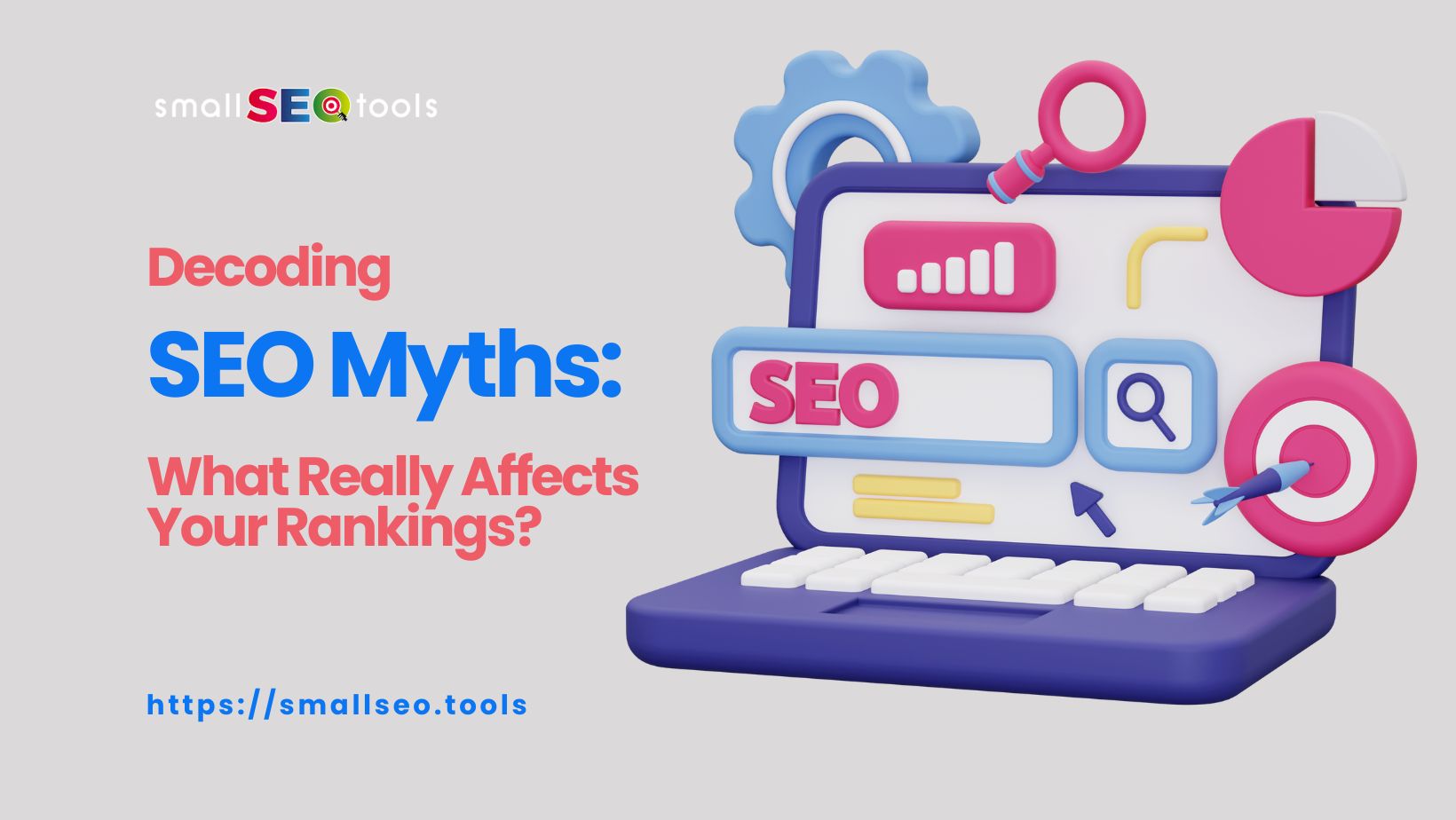Decoding SEO Myths: What Really Affects Your Rankings?
Search engine optimization (SEO) is a crucial strategy for businesses who want their website to rank higher in search engines like Google. However, with the constant changes in algorithms and best practices, SEO can feel overwhelming and complex. Over the years, many myths and misconceptions have developed about what works to boost rankings. This comprehensive article will debunk some common SEO myths and provide clarity on the key factors that truly impact your search visibility.

Technical SEO Fundamentals
Technical SEO involves optimizing the behind-the-scenes architecture, speed, security, accessibility, and indexing of your website. Getting the technical fundamentals right is necessary to build a solid foundation for high rankings.
Myth: Keyword Stuffing Your Site Works
In the early days of SEO, overstuffing web pages with target keywords was a common tactic. However, for many years now this excessive keyword stuffing can get your site flagged or penalized by search engines. The best practice is to use keywords naturally throughout your content to provide value for readers.
Myth: You Must Have HTTPS
While switching to HTTPS is recommended, it is not absolutely necessary for rankings. Many high-ranking sites still use HTTP. Focus on creating quality content rather than obsessing over protocols.
Myth: You Must Have a .com Domain to Rank Well
Google has officially stated that domain name extensions do not impact organic rankings. A well-optimized and authoritative .org, .net, or other non-.com domain can certainly outrank .com websites. What truly matters is building your overall domain authority and trust signals.
Truth: Site Speed Significantly Impacts Rankings
Slow page load times frustrate users and lead to high bounce rates, which hurt your conversions. Google has explicitly said they prioritize fast-loading sites in their rankings and organic search results. Use image compression, browser caching, CDNs and other optimizations to dramatically improve site speed.
Truth: Optimizing for Mobile is Critical
With increasing internet usage on mobile devices, Google has made mobile friendliness a strong ranking factor. Ensure your site loads quickly on mobile, the design responds well on smaller screens, tap targets are sized properly, and the experience is seamless.
On-Page Content Optimization Elements
Optimizing your on-page content with relevant keywords while providing value to human readers is another key for higher rankings.
Myth: You Must Obsess Over Keyword Density
In the past, SEOs focused heavily on keyword density, or what percentage of words on a page matched the keyword. Today, search engines are far more advanced, and excessive keyword density can hurt your rankings. Natural use of target keywords 3-5 times in a piece of content is sufficient. The focus should be creating high quality content that engages readers.
Myth: You Need Lots of Pages on Your Website
While having more optimized pages on your site can potentially help you rank for more keywords, quality trumps quantity every time. Just a handful of incredibly useful, in-depth pieces of content can outperform sites with hundreds or thousands of thin, low-value pages.
Truth: Optimized Meta Descriptions and Title Tags Matter
Your meta descriptions and title tags appear as the clickable headline and description for your pages in search results. Optimizing these with your target keywords can directly improve click-through rates. Use compelling, benefit-driven descriptions to entice searchers.
Truth: High Quality, Useful Content Wins Long-Term
Informative, well-researched, and useful content written to help and engage human readers (not just search bots) builds trust and loyalty over time. This signals true value to search engines, earning links and word-of-mouth promotion. Mediocre content may get short-lived wins but it won't sustain rankings.
Link Building and Earning Authority Signals
Link building remains one of the most crucial elements for signaling a website's authority and relevance to keyword phrases in search algorithms.
Myth: More Links Always Help Your Rankings
Simply getting more links is not enough. The focus should be on link quality over quantity. Just a handful of authoritative editorial links from reputable, high domain authority sites are far more powerful than hundreds of low-quality links from spammy or irrelevant sites.
Myth: Link Building is Manipulative or Unethical
When done right, link building simply means earning genuine editorial mentions, backlinks, and citations for your site across the web. You "build" links by creating highly valuable content and resources so that other sites are compelled to naturally link back to your content and cite your website.
Truth: Domain Authority Plays a Key Role
Earning a higher domain authority (DA) metric will directly help your site rankings for target keywords and phrases. Work on building DA through high-quality content, trust signals, link earning strategies, and positive online reviews.
Truth: Local Listings Are Vital for Local SEO
For local businesses who want to rank highly in their geographic area, registering complete and accurate business listings on directories like Google My Business is vital. Be sure to verify and optimize all key listings to rank higher in local search results.
The Role of SEO Specialists
With constantly evolving algorithms, guidelines, and best practices, SEO can be highly complex. More and more businesses are enlisting knowledgeable SEO specialists and agencies to handle optimization allowing them to focus resources on core operations and expansion.
An experienced SEO expert from Coreserp SEO company, for example, stays on top of the latest trends, tools, and strategies to get real results for your website and business goals. They can build a custom roadmap to improve technical elements, optimize content for conversions and visibility, earn high quality links, and capitalize on voice and local search opportunities. Their expertise allows businesses to “set it and forget it” when it comes to SEO.
As you can see, SEO has many intricate nuances, but a few core elements are proven to consistently drive higher rankings. Avoid falling prey to outdated myths and misconceptions. Focus your efforts on technical site health, optimized on-page content, high-quality link building, local listings, and leveraging SEO experts when needed. With an informed, comprehensive approach you can gain visibility and convert more organic searchers into customers over the long term.
leave a comment
Please post your comments here.SEARCH
-
Popular SEO Tools
- Paraphrasing Tool
- Plagiarism Checker
- Article Spinner / Rewriter
- Keyword Position Checker
- Grammar Check
- Domain Authority Checker
- Pagespeed Insights Checker
- Reverse Image Search
- Page Authority checker
- Backlink Checker
- Alexa Rank Checker
- Backlink Maker
- Domain Age Checker
- Website Ping Tool
- Website Seo Score Checker
- Keyword Density Checker
- Website Page Size Checker
- Word Count Checker
- Mozrank Checker

 ™
™